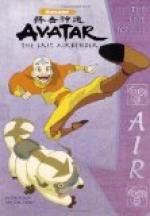The natives had returned to their camp to dress and to repair the damage done by the airplane. The white men were approaching what appeared to be the den of the bearded stranger, when the Major gave a cry of joy:
“Masts! Boys, we have finished the first lap of our journey. The den of the stranger is the cabin to his schooner. He is the trader who is to furnish us gasoline!”
The Major’s surmise proved to be correct, and they were soon sitting happily around a rough galley table, sipping at steaming “mulligan”—a rich Arctic stew—and coffee.
“And now,” said the Major, “for a few hours of sleep. After that your time is your own for twelve hours.”
“Twelve hours!” exclaimed Bruce in surprise. “Don’t we start for the Pole at once?”
“Young gentlemen,” said the Major smiling, “your enthusiasm is gratifying in the extreme. But flying, especially in high latitudes, is very trying on the nerves—even such nerves as yours. Remember that in the Arctic, where anything at all is liable to happen at a moment’s notice, we must always be at our best. So get some relaxation. What will you do with your twelve hours?”
“I heard a walrus barking a half-hour ago!” exclaimed Barney eagerly.
“I’m for a walrus hunt,” agreed Bruce.
“Good! That will stretch your legs a bit,” said the Major. “But don’t go too far, nor take too many chances. Remember you have a mission to accomplish here in the North.”
The three adventurers were soon sleeping soundly in the bunks of the Gussie Brown, and far away, bobbing his head through a water-hole and shaking the icicles from his moustache, a great bull-walrus barked at the moon.
When they awoke from dreamless slumber, the boys’ first thought was of the promised walrus hunt. They scrambled into their fur garments, and hurrying to the surface of the floe, listened for the hoarse call of their quarry, the walrus. They did not have to wait long.
“There he barks!” exclaimed Bruce, putting his hand to his ear.
“And again,” Barney hurried below to secure a native harpoon and skin-rope. Bruce provided himself with a high-power magazine rifle.
“We’re off!” Barney shouted joyously to the Major, as he gulped down a cup of steaming coffee and took a last bite of sour-dough bread.
“Good luck! And may you come back!” bantered the Major. Had he known how real was his jesting prophecy of danger, he would not have joked.
As a rule, walrus-hunting in the Arctic is not a sport, it is a task—the day’s work of providing food for a village. It is as exciting as the “hog-killing day” of a middle-west farmer. The hog may run amuck of the farmer, and so may the walrus of the hunter; the chances are about equal. The walrus seldom shows fight. Before he is harpooned, he either is quite indifferent to the presence of the hunter, or slips away to the water at sight of him. If harpooned, he makes every effort to escape, and only in rare instances shows fight. The boys had been told all this by the trader over their coffee the night before.




